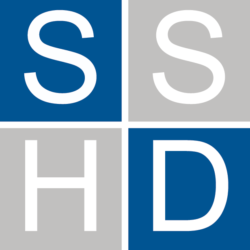SSHD hosted a panel for Academic Job seekers with some of the luminaries in the field of human development. Please view the recording here!
Webinar: Modeling Cognitive Aging in Context (Recording Available)
Modeling Cognitive Aging in Context, from June 30, 2020.
Recording available on the RHD Webinars page.
The webinar disseminates interdisciplinary work resulting from the first annual Summer Data Immersion program hosted by the Michigan Center for Contextual Factors in Alzheimer’s Disease (MCCFAD) in June 2019. Together, the five studies provide a rigorous examination of lifespan contextual factors that shape adult cognitive development, with a particular emphasis on racial/ethnic disparities in cognitive aging. Context is defined broadly in terms of geographic residence, socioeconomic conditions, social network characteristics, and the spousal/partner relationship. Findings have important implications for prevention and intervention strategies to reduce the global burden of age-related cognitive impairment.
Speakers:
Kimson E. Johnson(University of Michigan)
Kasim Ortiz(University of New Mexico)
DeAnnah R. Byrd (Wayne State University)
Benjamin Katz (Virginia Tech University)
Amanda Leggett (University of Michigan)
Moderator:
Jennifer Brown Urban, Montclair State University
After registering, you will receive a confirmation email containing information about joining the webinar.
Those who are interested in reading the complete published articles can find them in the upcoming issue of Research in Human Development, 17(1).
SSHD Statement on Current Events
Dear SSHD members:
America is currently undergoing profound grief, anger and reflection. This state of despair and the accompanying protests happening around the country follow from the unjust death, once again, of a black American man at the hands of authorities. The nation-wide protests are an attempt to initiate change at the larger systemic level. These actions affect everyone, and all of our voices and efforts are needed to move history and build a just nation. The legacy of racial discrimination and growing patterns of inequality across multiple social groups are also reflected in the disproportionate effects that the COVID-19 pandemic is having on people of color and other vulnerable populations. They are also apparent in the lack of a unified, national strategy to address the multi-level challenges that accompany this pandemic. The Society for the Study of Human Development (SSHD) promotes developmental research, education, and public policy that emphasizes the links between individuals, families and the larger social structures in which they live. The developmental science that SSHD promotes is meant to maximize individual and community well-being across the lifespan/life course. Systemic problems, such as police brutality and the differential burden of the COVID-19 epidemic in vulnerable groups, call for systemic solutions, and we would encourage members of the SSHD community and the broader research, education, and public policy communities to work towards creating opportunities that will ensure that black lives matter at all ages. For only when black lives matter will all lives matter. We advocate the application of developmental science as a means to emerge from this sorrowful time as a more democratic and equitable society, one where everyone can breathe freely.
To this end, SSHD is undertaking the following initiatives.
1. Our flagship journal Research in Human Development will continue to publish special issues on developmental research focused on underserved minorities.
2. The SSHD Steering Committee will vote on making the Diversity Science Initiative a standing committee of the Society.
3. Applied activities and future conferences will incorporate community outreach and address matters of diversity, equity, and inclusion via speakers or collaborative sessions with local agencies/communities.
4. SSHD will support and initiate developmental research that advances issues of diversity, equity, and inclusion. We welcome your suggestions for ways SSHD members and committees can make an impact on this issue. Please contact sshd.contact@gmail.com.
We welcome comments and suggestions.
The Steering Committee
Society for the Study of Human Development
Webinar Recording Available: Time Perspective from Adolescence through Adulthood
The free webinar Time Perspective from Adolescence Through Adulthood is available for viewing and posted in the archive.
Time is as essential as the air we breathe, yet research on time perspective—how we think and feel about the past, present, and future—has yet to examine the construct from adolescence to adulthood. In this webinar based on reports on a Special Issue of Research in Human Development, the speakers introduce time perspective as a multidimensional, developmental, and modifiable construct. Then, four studies on the topic including adolescents, young adults, middle-aged adults, and older adults are presented. This research incorporates diverse participants and age-specific outcomes. Collectively, this work sets the stage for the next era of research on time perspective.
Speakers:
Zena R. Mello, San Francisco State University; Frank C. Worrell, University of California, Berkeley; Julia Moon, San Francisco State University; Samuel Leonard, University of Memphis; Sarah Barber, Georgia State University
Moderator:
Jennifer Urban Brown, Montclaire State University
After registering, you will receive a confirmation email containing information about joining the webinar.
Those who are interested in reading the complete published articles can find them in the upcoming issue of Research in Human Development, 16(2).
Webinar Recording Available: “Being Human in Hard Times: Disturbing Trends and Signs of Hope”
The Webinar recording for Being Human in Hard Times: Disturbing Trends and Signs of Hope can now be accessed at this link.
Recent years seem to have been accompanied by great uncertainty and precarity in the United States and around the world: whether political strife within and between nations, volatility of economic markets, sexual harassment and assault, actions related to immigration and immigrant families, or violations of human rights, to name just a few issues. With the ripple effects of these events across the globe, our big world has at times never felt so small. And yet, perhaps in the larger arc of human history, change is simply a universal theme – as each generation or society faces, or feels, the unique circumstances of a time. For this reason, we have invited scholars to take a fresh look at some of the essential but underexplored aspects of human experience. We have asked authors to be visionary – to reflect on why the phenomenon they chose is crucial today, how it matters for development across the life span, how it comes about and what consequences it brings, and how it might be better theorized, measured, and analyzed to advance knowledge and its application.
Speakers:
Megan M. McClelland, Oregon State University
Monika Ardelt, University of Florida
Giacomo Bono, California State University, Dominguez Hills
Chris Napolitano, University of Illinois
Eranda Jayawickreme, Wake Forest University
Michael Cunningham, Tulane University
Roberto G. Gonzales, Harvard Graduate School of Education
Salwa Massad, World Health Organization
Moderator:
Jennifer Urban Brown, Montclair State University
After registering, you will receive a confirmation email containing information about joining the webinar.
2017 Society Award Winners
The Society for the Study of Human Development has established a number of awards to highlight the scientific and pedagogical contributions of researchers in the field of human development.
2017 Award Winners
- Early Career Award: Kristina Schmid Callina, Tufts University, and Amy K. Marks, Suffolk University.
- Distinguished Lifetime Career Award: Willis F. Overton, Temple University.
- Erin Phelps Award: Yoko Yamamoto, Jin Li, Jia Li Liu, Brown University and University of Connecticut for their paper "Does socioeconomic status matter for Chinese immigrants' academic socialization? Family environment, parental engagement, and preschooler's outcomes."
New Research in Human Development Issue
Table of Contents
Topic: Ecological Validity in Research on Human Development
Guest Editors: Manfred Diehl & Hans-Werner Wahl
Diehl, M., Wahl, H.-W., & Freund, A. M. Ecological Validity as a Key Feature of External Validity in Research on Human Development
Kunzmann, U., & Isaacowitz, D. Emotional Aging: Taking the Immediate Context Seriously
Dirk, J., & Schmiedek, F. Variability in Children’s Working Memory is Coupled with Perceived Disturbance: An Ambulatory Assessment Study in the School and Out-of-School Context
Bielak, A. A. M., Hatt, C. R., & Diehl, M. Cognitive Performance in Adults’ Daily Lives: Is There a Lab-Life Gap?
Wilkinson, L. R., Ferraro, K. F., & Kemp, B. R. Contextualization of Survey Data: What Do We Gain and Does It Matter?
Ram, N., Brinberg, M., Pincus, A. L., & Conroy, D. E. The Questionable Ecological Validity of Ecological Momentary Assessment: Considerations for Design and Analysis

